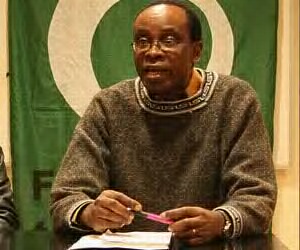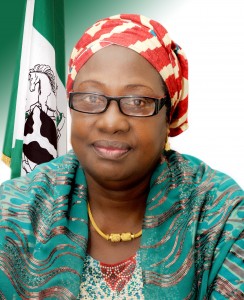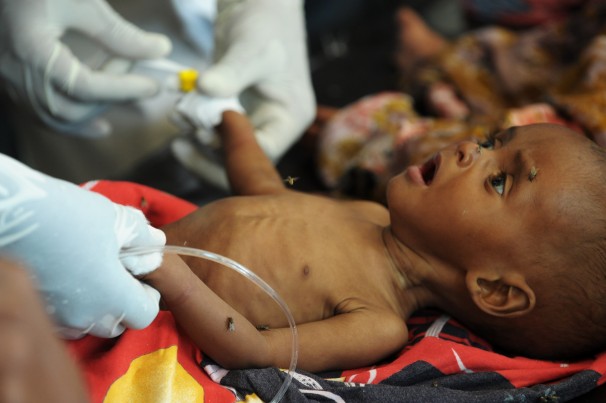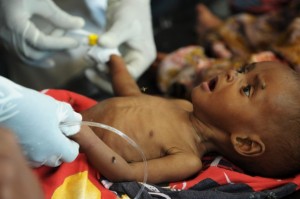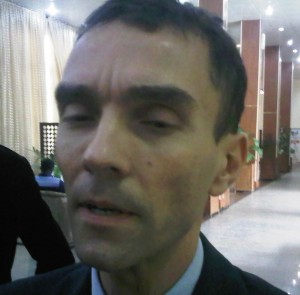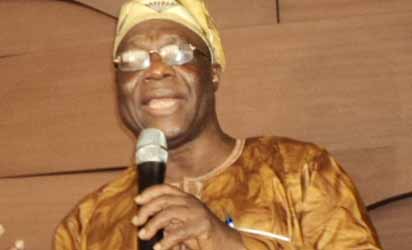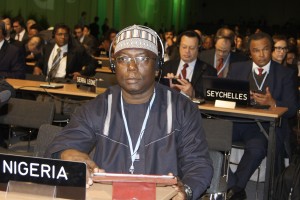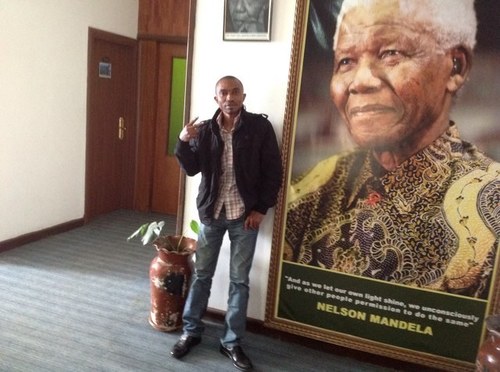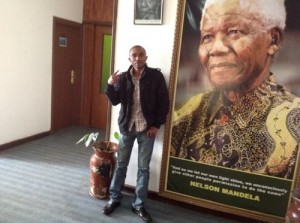About this time last year this writer had the tough job of settling a dispute between two friends. One is a Nigerian from the Niger Delta and the other a South Africa from the Witbank area. Their argument was over which was the most polluted place in Africa. Was it the oil fields of the Niger Delta or the coalmine fields of Witbank, South Africa? Pollution should not be a badge of honour for any people.

Without debate, these two locations are among the places worst afflicted by hydrocarbon extractive activities. The abandoned coalmines of Witbank are infernal places, littered with sinkholes and abandoned mines that are literally in fire. You are hit by the smell of sulphur as you approach some of the fields, and you simply must walk gingerly behind your guide or risk being swallowed by the waiting pits.
Sinkholes or just that: sinkholes. You could be walking, and suddenly the earth caves in and you are sunk into old coalmines. There are reports of schools and homes getting swallowed up by the hungry disembowelled earth.
South Africa does not hold a patent to sinkholes. There are at least one thousand, one hundred sinkholes in the tin mine fields of Jos. These sinkholes are testimonials of rapacious exploitation of nature where the exploiters care nothing about the environment as long as they have grabbed the money-spinner from the bowels of the earth. So it was that once crude oil became the major income earner for Nigeria other productive activities were relegated to the background. We appear to be experts at stepping into fresh water streams, drawing some water and muddying the rest.
Muddying the water is an apt metaphor for the situation in the oil field communities in Nigeria.
Over the 56 years that oil has been exploited commercially in Nigeria, the Niger Delta has been savagely abused. An environment that was once noted for its beauty and rich biodiversity is now an environment barely surviving on life support. Gas flares blaze from over 200 furnaces tormenting, terrorising and polluting communities 24 hours daily non-stop for decades. Oil spills are a regular occurrence and each time they happen the oil companies attempt to wiggle off liability by claiming that their spills are caused by third party interferences. They have so made ‘sabotage’ a song that even the most discerning can be drawn into believing their stock characterisation of even spills caused by the bursting of their aged pipelines that ought to have been put out of commission.
Toxic drilling muds and produced water are dumped daily into the lands and the creeks of the oil fields. Rather than stop these atrocious acts, heal the land, water and air, we ignore the realities on the ground and play politics with our very lives.
Since 13 per cent of oil rents began to be paid to states where oil/gas is extracted, there has been a tendency by some analysts to suggest that the revenue sharing formula unfairly favours those states. The contrary is the truth.
There are murmurs against the continued existence of the Niger Delta Development Commission (NNDC) and even the recently created Ministry of Niger Delta Affairs (MNDA). We agree that an entity such as the Ministry of Niger Delta Affairs does not address the real challenges of the oil field communities. Indeed this ministry may simply multiply bureaucracy while holding down the overall budget.
As is characteristic of Nigeria’s penchant for infrastructure politics, the NNDC and the MNDA focus a whole lot on provision of infrastructures. They operate almost as ‘government social responsibility’ outfits mimicking the so-called ‘corporate social responsibility’ efforts of the polluting oil companies. Due to years of utter neglect and human rights abuse these paltry gestures receive applause at times. Imagine an oil company displaying a supposed sense of responsibility by building clinics next to a site where they constantly dump toxic pollutants.
If we pay attention to the amount of damage that has been inflicted on the oil field communities we cannot escape the urgent need to invest in a massive clean-up of the entire region, covering all the Niger Delta states and other states like Ondo and Abia states where oil is extracted. We believe that if Nigeria were to embark on a thorough clean up and remediation of the environment of these states it would quickly be clear that a 13 per cent slice of the revenue would be a drop in the bucket.
Why do we say this?
First of all, hydrocarbon pollutions do not simply vanish without human efforts. They are toxic pollutants and must be handled technically and scientifically. Sadly, the best efforts cost a lot of money, but never really eliminate the problem. We do not have a record of really cleaning up spills and other harmful pollutions. Of course the gas flares roar on despite being outlawed since 1984. Even the proposed Petroleum Industry Bill (PIB) is a toothless dog as far as stopping gas flaring is concerned. The crime will continue at the pleasure of whoever is the minister in charge of petroleum resources.
Secondly, we look at two examples of clean-up efforts in the USA, assuming that the best efforts were brought to bear there. The Exxon Valdez spill of 1989 was cleaned up soon after it occurred. Twenty-five years after, evidence of the spill still remains. Four years ago the world was shocked by BP’s monster Gulf of Mexico spill. After billions of US dollars in fines and desperate clean-up efforts, the surface of the Gulf appears normal, but the impact on the aquatic life and on the coastlines remains. Both the crude oil and the chemicals used to fight the spills have indelible impacts on the environment. Even a casual visit to our communities show that our land is groaning under the weight of pollution. The story is the same whether you go to Ikot Ada Udo in Akwa Ibom State, Goi, Bodo City and Erema in Rivers State; Ikarama and Kalaba in Bayelsa State; Ubeji and Iwerekhan in Delta State; Oben in Edo State and Ago Iwoye in Ondo State.
The case of the 1970 oil spill at Ebubu Ejama in Rivers State is mindboggling and illustrates the fact that hydrocarbon pollution cannot be wished away but must be dealt with. That spill has remained fresh despite the efforts by the offending oil company to cover it with soil and to fence off the crime scene. Some of the crude oil has caked into coal like rocks. They just will not disappear. And we cannot ignore them. Neither can the community people pretend there is no open sore in their backyard, poisoning their farmlands and waters.
Another case to consider is the United Nations Environment Programme’s (UNEP) assessment of Ogoni environment. The report is almost three years old and is still begging for action beyond signposts confirming that Ogoniland is polluted. The UNEP report confirmed that all waters in Ogoniland are polluted with hydrocarbons and at places the water has benzene, a known carcinogen, at levels 900 times above WHO standards. The land itself is polluted at several places to a mind-boggling depth of five metres.
It is sad that not a pinch of the 13 per cent goes to environmental remediation. It is even sadder that ecological funds that ought to be dedicated to environmental restoration has become nothing more than just another political fund, another additional cash to be squashed.
UNEP said $1 billion would be needed to set up the framework for the clean-up of Ogoniland to begin. It is estimated that the waters will require 25 years to clean up while the land could be restored in five years. Experts estimate that it would require at least $100 billion to clean up Ogoniland. Almost three years after the UNEP report, we are still dithering, doing nothing about what has been clearly shown is killing our peoples.
We must not forget that oil extracted was halted in Ogoniland in 1993 although aged and problematic pipelines still cross through the area. Oil extraction and accompanying deadly pollutions continue unabated in the oil fields elsewhere.
Our conclusion is that oil money should be used to clean up oil pollution. And this is the time to do this. Oil is fast becoming an old energy form as the world comes to terms with the fact that the burning of fossil fuels for energy and for transportation is a critical contributor to global warming. Coupled with the fact that crude oil and gas are not renewable resources we do not need to argue that, one day, they will either get exhausted or become useless commodities in a world that would eventually see sense in fighting for the survival of the planet. Crude oil will slide into history, like it or not.
The implication is that we are running a deficit account with our petroleum resources. Oil pollution has reduced life expectancy in the communities to barely 41 years. The lands are polluted, the rivers and creeks are dead and the air has been stuffed with diseases. When we join Nigerian politicians to merely fight over the sharing of oil wealth we are fighting the wrong fight.
Our collective fight must be to restore our lands. Our collective fight must be to reclaim our lands. We should fight gas flares with the knowledge that they contribute to global warming and are a factor to desertification in 11 frontline states in the North. It is time to unite and put the money where the problem is.
Our fight should not be about sharing rents, but owning the resources in our lands as well as the means of production by which the materials in our domains are transformed. Fortunately, Nigeria is richly endowed. We have abundant natural resources everywhere we turn to. We have resourceful people. We need to take ownership of our resources, know that they are ours, work them and preserve our environment and stop the attitude of taking what we can grab and then damaging the rest.
Resource ownership is a win-win situation. It means we can exploit our resources or permit others to do so, but have a joint agreement about the financial architecture and arrangements that would engender the common good in a true federation. This is the concept of resource democracy that we must interrogate and pay close attention to, no matter how jolting it may initially seem to be. Placing the pot at the centre may be a romantic notion but, truth be told, it makes beggars of us all.
Resource ownership will put Nigeria back to work, allow us to reclaim the damaged environments of the tin mines of Jos, the coal mines of Enugu and Kogi, the gold mines of Zamfara and the cruelly wreaked environments where crude oil and gas are exploited.
Old and fossilised ways of thinking will not resolve current problems. The concept of predatory exploitation of disaster is worse than primitive capitalism. We have to wake up to the reality that, to escape poverty as a people, we must see beyond accumulating money but rather ensure that we invest all that is needed to restore our bastardised environment and thus secure a future for our children and the planet.
We have a choice to make. One option is to agree that no part of this Nigeria should be despoiled and abandoned simply because all we want is the revenue that comes from that territory. That option suggests that we would do all necessary to bring health to our challenged environments. The other option is to carry on with business as usual: extract, exploit, destroy, terrorise, oppress and move on with loaded purses not caring how irredeemably damaged the environment is. We shudder to think about what will happen when opencast mining of bitumen begins in Ondo and other states. That will be worse than the deadly crude oil fields.
This is the time to think beyond today and think about the future. At our stage of history we have to stop being appendages to paralysing financial and political constructs. A massive investment clean-up activities to rescue the Nigerian environment will create jobs and revive livelihoods, rebuild cultures and restore fading memories of what biodiversity we once had, what its fresh air smells like and how refreshing it is to drink from the creeks without dashing to the bare hospitals. It is time to turn to the productive, contributory path rather feasting on each other’s harm.
By Nnimmo Bassey (Director, Health of Mother Earth Foundation)

